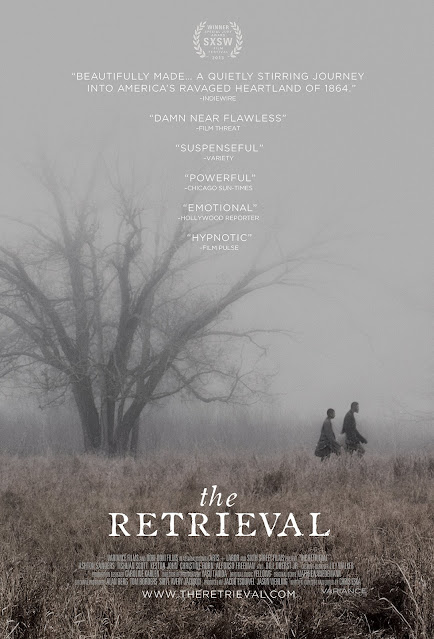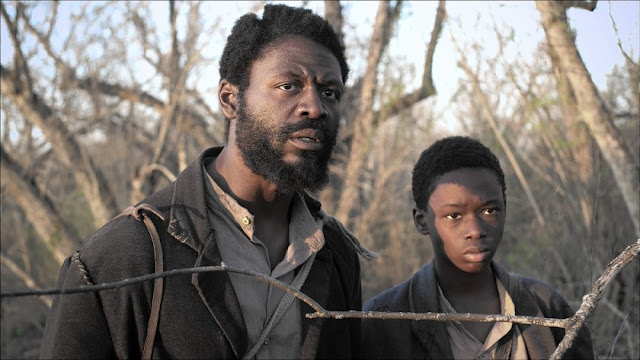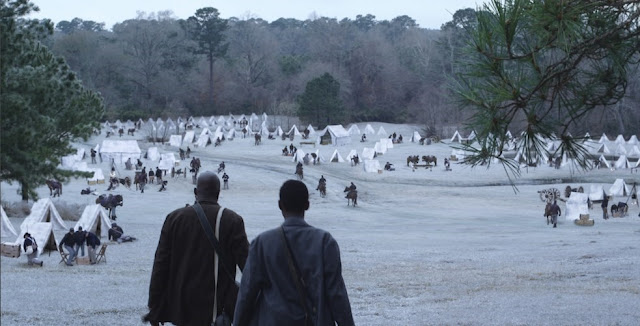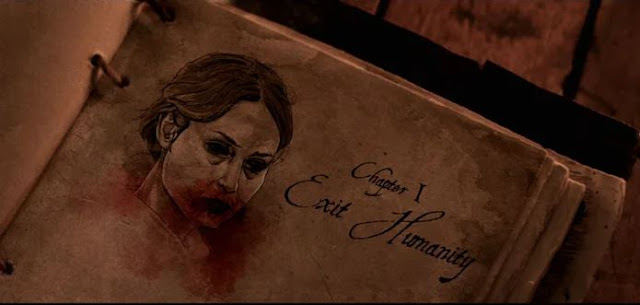“Courage did not come from the need to survive, or from a brute indifference inherited from someone else, but from a driving need for love which no obstacle in this world or the next world will break.”
— Gabriel García Márquez, Love in the Time of Cholera
The phrase “beautiful zombie movie” is probably all kinds of things: an oxymoron, a contradiction, and if you want to get really philosophical, a paradox. But that’s exactly what 2011’s Exit Humanity is. It’s gorgeously written, envisioned, photographed, scored, and realized. It just so happens to feature the undead ripping apart human beings.
Say the word “zombie” over and over and it eventually loses meaning. The oversaturation of zombies in film and television has long been threatening to do the same: showing you the same undead carnage over and over until those rotting, shuffling ghouls lose their power to make your blood run cold. Following the Resident Evil film franchise and the television dramas The Walking Dead, iZombie, Z Nation, and probably more of which I’m not aware, zombie horror has become spread so thin and overdone that a zombie doesn’t mean anything anymore. Twenty years ago, watching a zombie crack open a skull and reach inside for its gooey treat was just for horror fanatics. Now it’s for grandmothers. Even the zombie comedy – always the telltale sign that a previously terrifying concept is on its last leg – has become overdone. Once your horror is Abbott & Costello’ed, that horror is no longer horrific.
Recent mainstream attempts at adding horror elements to a pre-existing institution, whether it be a real human being (Abraham Lincoln: Vampire Hunter) or a fictitious event (Pride & Prejudice & Zombies) were made by filmmakers with their tongues firmly planted in their cheeks, afraid to take their concepts seriously for fear of being laughed out of theaters. Exit Humanity, about a war-torn America contending with the marauding undead, is another kind of historical mash-up – one that’s not afraid to embrace its concept without hiding behind a curtain of cheekiness. It doesn’t re-imagine any real historical figure as a secret monster killing machine, and its immersion in the past is not done for kitsch value.

George A. Romero’s initial zombie quadrilogy had a bonafide purpose – to ask a pertinent question about the human condition, and society’s ability to steer clear of corruption. Exit Humanity has a question among those lines, but one a bit more specific: what if, during the most tumultuous time in American history, there were a greater danger that wasn’t choosing sides? Didn’t care about your man-made conflict? Was going to destroy and consume you regardless of your uniform’s colors? Would America stop warring with itself? Would it forget this initial conflict that amounted to nothing more than a petty squabble in the face of real and absolute destruction?
The year is 1865. Edward Young is a confederate soldier, caught between the union enemy trying to put him down for God and Country, and a single undead soldier slowly trickling through the trees toward him. We don’t know why the dead walk. At this moment, we’re not given a reason. Instead, we’re immediately thrust into this horror. Edward battles this monster and survives the encounter, but it will prove to be the first of many, and soon it will eclipse this other thing we’ve heard spoken of and seen written down so many times before in our history books that its significance and implications have lost all meaning: we’re in the midst of the American Civil War.
Six years later, it’s 1871. The war is over, the country remains in shambles, and the dead still walk, but those soldiers and civilians who survived the battlefield do their best to live their lives anyway. Edward returns home from hunting to see that his wife has been reborn as one of undead. With no choice, Edward kills her and departs to find his missing son. It’s not much later that he does: young Adam shambles toward him with full-dark eyes and pale, dead skin. For a second time, Edward is left with no choice. He returns home a tortured soul, and the muzzle of his pistol soon hovers beneath his chin. However, he realizes he has unfinished business. He remembers the promise he’d made to Adam – to take him to Ellis Falls, a waterfall miles from their home. Deciding to keep that promise, Edward gathers the boy’s ashes in a small tin, hops on his horse, and sets off on his journey – one he’s not sure he’ll survive. But what a one he’ll have.

Exit Humanity is Day of the Dead with a dash of The Outlaw Josey Wales by way of Terrence Malick – think The Assassination of Jesse James by the Coward Robert Ford re-envisioned as a zombie film. Written and directed by indie filmmaker John Geddes (Hellmouth), Exit Humanity is a thoughtful and introspective take on a subgenre that’s been done to death…and it just might be the weightiest addition to the genre since Romero’s foursome. And like Romero’s films, the zombies are always present as a looming threat, though they’re often not in the foreground – or background. The dread and foreboding created by them is what drapes over the running time, but indeed, for a good stretch, there are none to be found. Because, Exit Humanity isn’t a movie about people barricading themselves into a house and fighting off the walking dead, and it’s not about gore effects and carnage. It does, however, very much contain that original Romero sense of purpose: to hold up a mirror to society and ask, point blank, “What’s your fucking problem?”
Exit Humanity is about the human spirit, but also about what humankind are willing to do to each other. It’s about a country split in two because of political ideology, and how it makes enemies out of former friends and neighbors. At this very moment in reality, 150 years after the end of the Civil War, America has been re-divided. Hate is soaring. Trust in media has been called into question. Everything is politicized – right down to the American flag. Look no further than the 2016 election – the most divisive and ugly presidential campaign in this country’s history. Clinton (vs. Sanders) vs. Trump changed relationships, and in more extreme cases, destroyed friendships and marriages; it upended faith in the political process; it took all the progress made over the last decade and dismantled it, slowly, little by little. The very thing we held onto as the backbone of our republic – the democratic process – had been abused and manipulated and bastardized by forces here and abroad. In the wake of the election results, hateful groups with hateful thoughts and messages suddenly felt emboldened. These people were going to take back their country, believing it had gone somewhere dark and sinister, and only they could save it. As a result, well-meaning messages and movements striving toward racial equality were rewritten as anti-patriotism and terroristic to neutralize their power. And hate crimes increased 5%.
When the new normal (this is not normal) is to wake up in the morning and see city squares overtaken by hordes of white supremacists – see them take the life of a peaceful protester – and hear our president call some of them “fine people,” Exit Humanity doesn’t just become depressingly relevant – it becomes a teachable moment.

In our less surreal political past, friends and family at ideological odds could always take comfort in knowing that, even when they disagreed most vehemently, each was doing so because of the profound love they had for their country, and felt whatever stance on whatever position they had taken was because of this love. But now – in a country where the word “science” has become tantamount to witchcraft, where people get their news from Uncle Bob on Facebook, and where it looks more and more likely every day that our president has committed treason to gain his position of power – that reasonable barrier of political disconnect is gone. We’re in a whole new world now, Twilight Zone-ish in its unfamiliarity, but very unfortunately not a place of science fiction. The unyielding trust that a large portion of the United States continues to put into a president who has done absolutely nothing to earn it is surreal, and scary, and extremely sad. Just this week, a Trump voter said this about his loyalty toward the current commander-in-chief: “If Jesus Christ gets down off the cross and told me Trump is with Russia, I would tell him, ‘Hold on a second, I need to check with the president if it’s true.’” (Source: CNN.) (Source: FAKE NEWS.)
This has become the new normal (this is not normal), and it makes absolutely no goddamn sense.
During a time when politicians still had class and honor and a sense of duty, Bobby Kennedy, in the speech “the Mindless Menace of Violence” that he gave following the shooting death of Martin Luther King Jr., once implored us to look at each other not as strangers, but as members of a community with a common goal for good:
When you teach a man to hate and fear his brother, when you teach that he is a lesser man because of his color or his beliefs or the policies he pursues, when you teach that those who differ from you threaten your freedom or your job or your family, then you also learn to confront others not as fellow citizens but as enemies – to be met not with cooperation but with conquest, to be subjugated and mastered. We learn, at the last, to look at our brothers as aliens, men with whom we share a city, but not a community, men bound to us in common dwelling, but not in common effort. We learn to share only a common fear – only a common desire to retreat from each other – only a common impulse to meet disagreement with force. For all this there are no final answers.
It’s scary to read those words now and think that’s a place toward which we can never return – that this idea of all Americans co-existing in peace is still obtainable. With each passing day, it starts to feel like a hazy dream, the details of which are wisping away like smoke.
Exit Humanity argues for hanging onto that dream, but it also presents the same conundrum as it examines the continued division among men within the confines of the overall bigger walking horror: “What divides us in such times? What brings us together?”

Interestingly, director Geddes never makes any blanketed denouncements against the confederacy movement. He doesn’t go the redemption route and take a moment to introduce Edward as a brash and hotheaded racist whom incrementally discovers his inner George Bailey. Except for the brief battle scene opening, we never see a single union soldier – no one representing the north in any fashion later appears to challenge Edward’s ideology. There are no conversations about the chasm between abolitionists and anti-abolitionists. The words “slave” or “black” or any period-appropriate derivatives are never uttered. Even though the Civil War was very much about this, Exit Humanity isn’t. Again, it’s thinking bigger picture. So yes, our protagonist is a confederate soldier, whom history has taught us to be the enemy, but on screen, we don’t see someone with enemy qualities. We first see a soldier fighting in a war – with neither judgment nor condonation spared for him – and later, we see a husband and father going through the worst kind of emotional turmoil in the most unforgiving of landscapes. And it won’t be until a later act where he encounters the villainous confederate General Williams. “You used to fight with us?” the general asks him while a gun is pointed at Edward’s face. “Looks like we got a new kind of fight on our hands,” Edward responds. “The war is over…I’d rather live amongst the living dead than with men like you.” It’s clear: whatever loyalties he had to the spirit of the south are gone.
Mark Gibson makes his film debut as Edward Young – frankly, a role that could have only been played by a newcomer. Gibson’s desire to prove himself as an actor results in a performance unafraid to embrace the unusual premise; he bares his soul in what most people would write off as simply a genre film. At times, Exit Humanity threatens to overindulge in schmaltz through his character, some of it having to do with a few too many anguished bellows, but Gibson then reins it back with a focus on Edward’s humanity.
For such a low-key production, the film boasts a cast of well-known genre faces. Dee Wallace and Bill Moseley appear in supporting roles, one representing decency (Eve, the “witch” who was banished to the woods), and the other depravity (General Williams, for whom the war will never end). Stephen McHattie also appears as a conflicted (and consistently drunk) surgeon/scientist named Johnson who is tasked with fulfilling the general’s hopes in finding the cure for “the scourge” – one that requires the purposeful infection of the kidnapped civilians imprisoned in their underground bunker. Finding someone immune means controlling the infection, and that means weaponizing the dead… at which point General Williams can take back the South, “restore order,” and finally win his war.

Connecting everything is the narration by acting legend Brian Cox; it both propels the story and embodies Edward’s inner self – not to mention that Cox’s involvement achieves an air of legitimacy for a film otherwise cast with unfamiliar or genre faces. His off-screen character of Malcolm Young, descendent of Edward, reads entries from the journal that Edward kept during his journey across the zombie-infested lands of former America, some which complement a handful of beautiful animation sequences that bring Edward’s own journal illustrations to life. In a film already taking risks, this is just one more aspect that makes Exit Humanity daring and different.
Perhaps the best aspect to
Exit Humanity is the gorgeous musical score by Nate Kreiswirth, Jeff Graville, and Ben Nudds, which can oftentimes sound so soaring and intimate and pregnant with swelling strings that it feels like it doesn’t belong anywhere near a horror film – music that would sound at home in a dramatic sweeping epic about star-crossed lovers or some such mother movie. (One track in particular, called “Edward and Isaac Bond” on the soundtrack [which you can
download for free from Bandcamp], is so good that it’s used a second time for the closing credits.)
In a first-act flash back, Edward’s wife asks him what he wants in life. “I just want to be a good man,” he replies. “Good to you…our son. That’s all I want in life.” And throughout Exit Humanity, he confronts his own personal horror – that he didn’t live up to that want. Whether it’s his time spent on the confederate side, or the brutality he’d go on to commit against the living dead, or simply that he continued to live while his family did not, Edward spends much of the film believing himself to be a bad man – unworthy of love or companionship or peace. Because, throughout Exit Humanity, his resolve is tested. Edward Young loses everything. He loses the war. He loses his home. He loses his wife and son. At one point, he even loses the will to keep going. But he doesn’t let it destroy him. It takes time, but he seizes on the thing he believes will resurrect his happiness. He’s existing in a country that no longer resembles itself, and he’s lost his familial bonds, and he’s at odds with the very people with whom he once fought alongside, but he can see through all of that and know what’s really important.
“It’s never too late to heal the soul,” one friend once told another.
Exit Humanity is about the hope for humanity. It’s an artful message begging us not to give up – not to ever give up – not in the face of war, or death, or division, or the crumbling of this thing once known as social order. And as suggested during the film, the scourge of the undead seems to plague the worst of mankind throughout history – even as far away and isolated as a slave ship in European waters two hundred years before the war. The living dead aren’t just reapers that have come home to sow; they’re our reckoning. They’re our executioners. They’ve come to restore the natural balance. They’ve come many times before, and if need be, they’ll come again. In the film’s opening moments, Malcolm Young warns us that his ancestor’s journal from which he is about to read should be taken, for every generation, “…as a warning on how we should govern ourselves in such times.”
Exit Humanity is an allegory for the spirit, a warning for the future, and a reminder of what can be lost. It’s a living painting. It’s cinematic poetry.
It’s, dare I say it… important.















